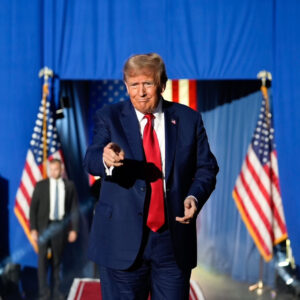Since mid-July, only one poll in the RealClearPolitics average put Trump’s New Hampshire support below 40 percent. On Sunday morning, the UNH Survey Center broke that streak, reporting Trump at 50 percent among likely First in the Nation GOP primary voters.
“Entering the final days of the campaign following the Iowa caucuses and the withdrawal of former New Jersey Governor Chris Christie and entrepreneur Vivek Ramaswamy, half (50 percent) of likely New Hampshire Republican primary voters say they will vote for Trump in Tuesday’s primary, 39 percent support Haley, 6 percent support Florida Governor Ron DeSantis, 3 percent support another candidate, and 2 percent remain undecided,” the UNH Survey Center reported.

Both Trump and Haley’s numbers have risen as other candidates have dropped out. Significantly. Trump’s share of unaffiliated voters has risen as well, even as he’s added more support among registered Republicans.
“It is important to note that no candidate has won their party’s primary without winning the plurality of their party’s registered voters,” said Andrew Smith, Director of the UNH Survey Center. “It will be very difficult for the Haley campaign to convince more undeclared voters to vote in the Republican primary and to vote for her in the remaining days of the campaign.”
Also Sunday morning, Suffolk University pollster David Paleologos released his latest daily tracking poll, and the trend of Trump growth continued.
The Suffolk University/Boston Globe/NBC-10 poll of 500 likely NH GOP Primary voters on Wednesday (January 17) was Trump at 50 percent, Haley at 34 percent, and DeSantis at 5 percent.
Sunday morning’s poll put Trump at 55 percent, Haley at 36 percent, and DeSantis at 6 percent.

And Sunday afternoon, Emerson College released a new poll that also had Trump at 50 percent, with Haley 15 points behind at 35 percent.
“Ahead of Tuesday’s primary, Trump has regained majority support in New Hampshire,” Spencer Kimball, Executive Director of Emerson College Polling, said. “The former president holds nearly two-thirds of support among registered Republican voters in the primary, leading Haley 65 percent to 23 percent. Haley holds the plurality of independent voters’ support, leading Trump 47 percent to 33 percent.”
According to Kimball, Haley has the support of a plurality of votes in her best groups — voters over 70 and those with postgraduate degrees. “Trump has a more commanding lead over Haley within his base demographics, leading 62 percent to 17 percent among voters under 40, and 61 percent to 18 percent among voters with a high school degree or less.”
All three polls were taken before DeSantis announced he was suspending his campaign and endorsing Trump.
The polling story in the Granite State has been steady for months, with Trump maintaining what New Hampshire Institute of Politics Executive Director Neil Levesque has called the “goalpost” position. “Trump’s approval hasn’t moved. He’s the goalpost, and the rest of the candidates are trying to move down the field.”
But Trump moved the goal line from 45 percent to 50 percent in the wake of his big win in the Iowa caucuses. Part of that can be attributed to Vivek Ramaswamy dropping out of the race and endorsing Trump. And DeSantis’ departure is expected to add to Trump’s margin as well.
Trump has also helped his cause with some high-profile endorsements in the past week, including Haley’s fellow Palmetto State pol, Sen. Tim Scott, who came to Concord Friday to formally announce his support for the former president.
Haley, on the other hand, lost an opportunity to boost momentum when she finished behind DeSantis in the Hawkeye State. Gov. Chris Sununu has been stumping the state for weeks, but the biggest endorsement she’s picked up since Iowa was from former Arkansas Gov. Asa Hutchinson. Hutchinson dropped out of the race after finishing behind businessman Ryan Binkley in the Iowa caucuses.





